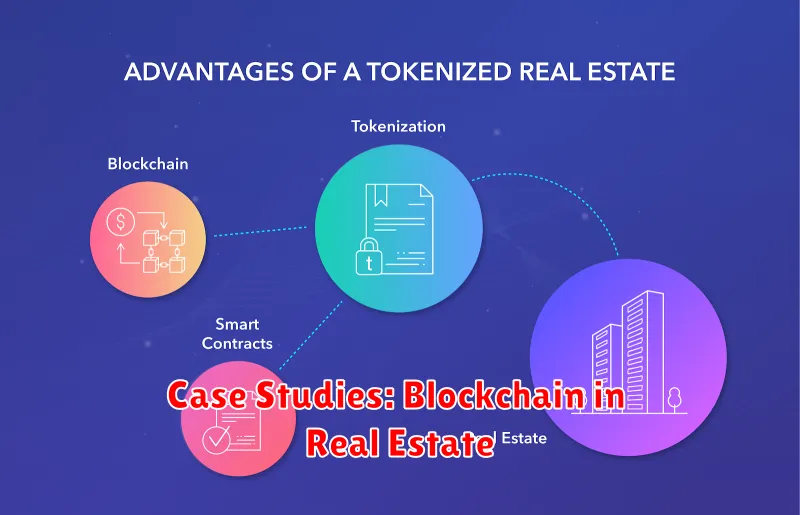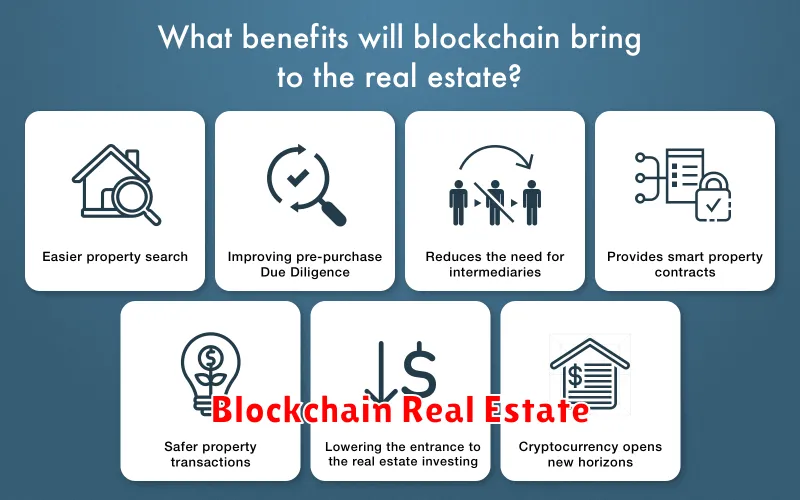The real estate industry, traditionally known for its opaque and cumbersome processes, is undergoing a dramatic transformation thanks to the emergence of blockchain technology. Blockchain, the decentralized and transparent ledger, is disrupting traditional methods and ushering in a new era of efficiency, security, and accessibility. From streamlining transactions to eliminating intermediaries, blockchain in real estate is reshaping the way properties are bought, sold, and managed.
By leveraging the power of smart contracts, blockchain is automating processes and reducing reliance on third parties. This not only speeds up transactions but also increases transparency and security, minimizing the risk of fraud and errors. As the adoption of blockchain technology continues to grow, its impact on the real estate industry is expected to be profound, revolutionizing the way we interact with property ownership and investment.
The Role of Blockchain in Real Estate Transactions

Blockchain technology is revolutionizing the real estate industry, streamlining and simplifying transactions. Blockchain’s decentralized and transparent nature offers a secure and efficient platform for handling real estate transactions, transforming traditional processes.
One of the primary benefits of blockchain in real estate is the elimination of intermediaries. Smart contracts, coded agreements stored on the blockchain, automate tasks like escrow management, reducing the need for third-party involvement and associated fees. This fosters a more efficient and cost-effective transaction process.
Furthermore, blockchain enhances transparency and security. The immutable and traceable nature of blockchain records ensures that all transaction details are transparent and verifiable, reducing fraud and disputes. This transparency fosters trust among parties involved, fostering a more reliable and secure real estate market.
Blockchain also enables fractional ownership of real estate assets. By tokenizing real estate, investors can buy and sell fractional ownership rights, making real estate investment more accessible to a broader audience. This innovation increases liquidity in the market and democratizes access to lucrative real estate opportunities.
The use of blockchain in real estate is still in its early stages, but its potential is vast. As the technology matures, we can expect to see more innovative applications, further streamlining and transforming the real estate industry.
How Smart Contracts are Revolutionizing Property Deals
The real estate industry, long known for its cumbersome and time-consuming processes, is undergoing a dramatic transformation thanks to the emergence of blockchain technology. At the heart of this revolution are smart contracts, self-executing agreements that automate and streamline property transactions, offering significant advantages over traditional methods.
Smart contracts eliminate the need for intermediaries, such as lawyers and escrow agents, by automating key aspects of the deal. This not only reduces costs but also speeds up the process significantly. Once the terms of the contract are agreed upon and coded into the blockchain, the transaction is executed automatically, eliminating the risk of human error and delays associated with manual processes.
Moreover, smart contracts provide enhanced security and transparency. The immutability of the blockchain ensures that all transaction records are permanently stored and cannot be altered, creating a verifiable and transparent audit trail. This eliminates the risk of fraud or disputes arising from conflicting documentation or discrepancies in records.
The impact of smart contracts on property deals extends beyond efficiency and security. They also facilitate fractional ownership, allowing investors to purchase small portions of properties, making real estate investments more accessible to a wider audience. This democratization of ownership can boost liquidity in the market, driving innovation and creating new investment opportunities.
In conclusion, smart contracts are revolutionizing property deals by streamlining transactions, reducing costs, enhancing security, and increasing transparency. As blockchain technology continues to evolve, we can expect further innovations in real estate, ultimately creating a more efficient, secure, and accessible market for both buyers and sellers.
Benefits of Blockchain for Real Estate Security
The real estate industry is undergoing a major transformation, with blockchain technology at the forefront of this evolution. Blockchain’s decentralized, transparent, and secure nature is revolutionizing traditional practices and offering numerous benefits, particularly in the realm of security.
One of the most significant benefits of blockchain for real estate security is the elimination of fraud. Blockchain’s immutable ledger ensures that all transactions are recorded permanently and transparently, making it extremely difficult for fraudulent activities to occur. This transparency also reduces the risk of errors and misinterpretations, enhancing the accuracy and reliability of real estate records.
Blockchain also streamlines the entire real estate transaction process, from property ownership transfer to mortgage management. This automation not only speeds up transactions but also reduces the reliance on intermediaries, minimizing the potential for human error and fraud. By creating a secure and efficient system, blockchain increases the overall security of the real estate market.
Furthermore, blockchain provides enhanced property rights protection. By creating a verifiable and tamper-proof record of ownership, blockchain ensures that property ownership is clearly defined and secure. This clarity eliminates disputes and legal complications that can arise from ambiguous ownership records.
In conclusion, blockchain’s impact on real estate security is profound. By eliminating fraud, streamlining transactions, and providing enhanced property rights protection, blockchain is creating a more transparent, efficient, and secure real estate ecosystem. As blockchain technology continues to evolve, its role in transforming the real estate industry is expected to grow even stronger, solidifying its position as a cornerstone of a secure and reliable real estate market.
Challenges in Implementing Blockchain in Real Estate
While blockchain holds immense potential to revolutionize the real estate industry, several challenges stand in the way of widespread adoption. These hurdles can be categorized into regulatory, technological, and adoption-related issues.
Regulatory uncertainty is a significant concern. Governments worldwide are still developing frameworks to govern the use of blockchain in real estate transactions. This lack of clarity creates uncertainty for investors, developers, and other stakeholders, hindering the adoption of blockchain solutions.
Technological limitations also present obstacles. Blockchain technology is still evolving, and some aspects, like scalability and interoperability, remain unresolved. The complexity of integrating blockchain into existing real estate systems, which are often outdated and fragmented, poses a challenge.
Adoption challenges stem from the resistance to change within the traditional real estate ecosystem. Many players are hesitant to embrace new technology, particularly when it involves disrupting established processes and workflows. Overcoming this inertia requires significant education and awareness campaigns.
Despite these challenges, the potential benefits of blockchain in real estate are undeniable. Addressing these issues through collaboration among stakeholders, regulatory clarity, and continued technological advancements will be crucial for unlocking the full transformative power of blockchain in this sector.
Future Trends in Blockchain-Powered Real Estate
The real estate industry is on the cusp of a major transformation, thanks to the innovative potential of blockchain technology. This transformative technology is poised to revolutionize various aspects of real estate, from property ownership and transactions to financing and property management. As blockchain technology continues to evolve, several exciting trends are emerging that will shape the future of real estate.
Smart Contracts: Blockchain-powered smart contracts are set to automate and streamline real estate transactions. These self-executing contracts eliminate the need for intermediaries, such as lawyers and escrow agents, reducing transaction costs and timelines. Smart contracts also enhance transparency and security, as they are immutable and auditable, providing a verifiable record of all transaction details.
Tokenized Real Estate: Fractional ownership of real estate is becoming more accessible through tokenization. Blockchain allows for the creation of digital tokens representing ownership rights in properties, enabling investors to purchase and trade fractional ownership stakes with ease. This opens up new investment avenues and democratizes access to high-value real estate assets.
Decentralized Property Management: Blockchain technology can facilitate decentralized property management systems, allowing for more efficient and transparent property management. Smart contracts can automate rent payments, maintenance requests, and other property management tasks, reducing administrative burden and increasing tenant satisfaction.
Digital Identity and KYC: Blockchain-based digital identity solutions can simplify Know Your Customer (KYC) processes in real estate transactions. These solutions provide secure and verifiable identity verification, reducing fraud risks and streamlining transaction procedures.
Real Estate Metaverse: The convergence of blockchain and virtual reality is giving rise to the real estate metaverse, where virtual representations of properties can be bought, sold, and managed within immersive digital environments. This emerging trend offers new opportunities for real estate investment and development, blurring the lines between the physical and digital worlds.
As blockchain technology continues to evolve and gain traction, these trends are set to reshape the real estate landscape, creating a more efficient, transparent, and accessible industry for both buyers and sellers. The future of real estate is poised to be driven by innovation and disruption, with blockchain playing a pivotal role in shaping this exciting transformation.
Case Studies: Blockchain in Real Estate

The transformative power of blockchain technology is not limited to the realm of cryptocurrencies. It’s making significant inroads into the traditional real estate industry, streamlining processes, increasing transparency, and boosting efficiency. Here are some compelling case studies that illustrate the practical applications of blockchain in real estate:
Propy
Propy, a leading blockchain-based real estate platform, facilitates seamless cross-border property transactions. Through its platform, buyers and sellers can access secure, transparent, and efficient property records. By leveraging smart contracts and blockchain technology, Propy eliminates intermediaries, reduces paperwork, and speeds up the closing process. This eliminates the need for traditional escrow services, making the process significantly more cost-effective and transparent.
RealT
RealT focuses on fractionalized ownership of real estate assets. This innovative platform allows individuals to invest in properties they might not be able to afford outright. RealT tokenizes real estate assets, making them divisible and easily tradable on the blockchain. This approach democratizes real estate investing by making it accessible to a broader range of individuals.
Title Companies
Numerous title companies are exploring the use of blockchain to improve the efficiency and security of property records. By recording property deeds and other vital information on a blockchain, these companies can enhance data integrity, prevent fraud, and streamline the title search process. This reduces the risk of title disputes and significantly improves the overall transaction experience.
Smart Contracts
Smart contracts, a core component of blockchain technology, can automate various aspects of real estate transactions. For instance, they can automatically enforce lease agreements, manage rent payments, and even trigger property transfers based on predefined conditions. This eliminates the need for manual intervention and significantly reduces the risk of errors or disputes.
These are just a few examples of how blockchain is revolutionizing the real estate industry. As the technology matures and its adoption grows, we can expect even more innovative applications to emerge, further transforming the way we buy, sell, and manage property.

